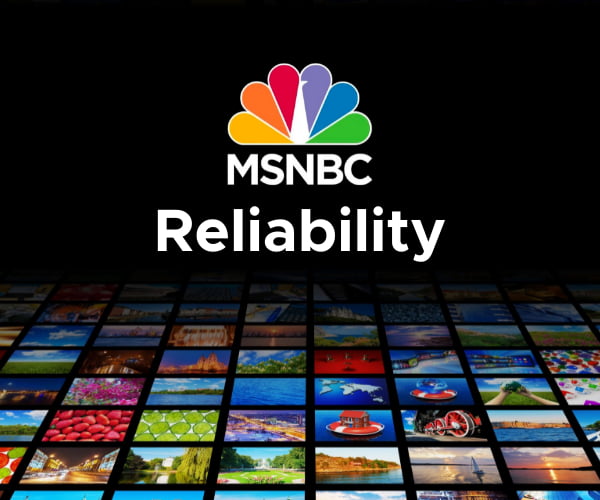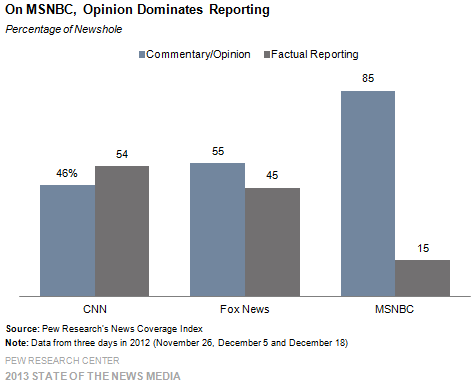
MSNBC is a prominent news source that has garnered a substantial following, particularly among liberal viewers. MSNBC has grown significantly in popularity over the years, becoming one of the top cable news networks in the United States. It competes with other major news networks such as Fox News and CNN for viewership and often ranks highly in ratings. The network has attracted a large and loyal audience, predominantly consisting of liberal or progressive viewers who appreciate its political commentary and analysis.
Nonetheless, the question of its reliability continues to be a subject of debate. In this article, we will delve into MSNBC’s dedication to accuracy, as well as its approach to selecting and omitting stories, with the goal of evaluating the dependability of this news organization.
We will consider factors such as the network’s history, the balance between opinion and factual reporting, and the potential influence of editorial or corporate interests on its content. By examining these aspects, we aim to provide a comprehensive understanding of MSNBC’s journalistic integrity and the extent to which it may be affected by subjective perspectives or inaccuracies in reporting.
Does Reliability Matter?
Reliability, in general, refers to how trustworthy or accurate information, or in this case, a news source is. If we consider this definition, it quickly becomes clear why reliability is important in media sources. If we can’t trust the things we read then there isn’t much of a point in continuing to consume content from that source, after all. So how exactly can we gauge the reliability of a news source anyways?
There are several potential measures of reliability to look out for when trying to determine whether a media source is reliable or not. Red flags for an unreliable article can include the presence of wild unsubstantiated claims, facts dependent on other unreliable sources, heavy use of opinionated language, and more. Some indicators of a reliable news source, on the other hand, include things like:
- Absence of subjective/opinionated language in articles
- Credible sources cited (e.g., neutral sources, .gov, .edu websites)
- Facts and statistics backed by multiple relevant outside sources
- Use of primary sources when possible (e.g., interviews, quotes)
- Information that remains consistent across news sources
So How Does MSNBC Fair?
The political reliability index developed by Biasly objectively assesses news organizations’ accuracy and trustworthiness. MSNBC’s overall Reliability Score has been rated as ‘Fair’ by Biasly. This rating is a weighted average of two distinct scores: the Fact Analysis Score and the Source Analysis Score, each evaluating separate components of MSNBC’s Reliability. When computing the Average Reliability of the article the Fact Analysis score is more heavily weighted. These ratings are as follows in the next two paragraphs:
MSNBC’s Fact Analysis Score is ‘Fair,’ which suggests readers can trust some of MSNBC’s content online. The Fact Analysis score focuses more on the accuracy of claims, facts, and sources presented in the article and any hints of selection and omission bias, which we will discuss further in the article.
MSNBCs Source Analysis Score is ‘Fair,’ which suggests readers can trust some of the sources, links, and quotes provided by the news source. This score, which is based on A.I., focuses on assessing the quality of sources and quotes used including their number, lengths, uniqueness, and diversity.
However, since these scores are based on percentages and averages, individual articles could be more or less trustworthy depending on the context, author, and other factors. Our findings show that MSNBC’s reliability is mostly but not all factual because they have retracted several stories in the past or had pieces that were not factual.
Let us analyze the supporting data for MSNBC’s rankings and discuss what to watch out for while searching for trustworthy news sources.
MSNBC Accuracy and Reliability
Many have questioned the accuracy and reliability of the articles put out by MSNBC, with some claiming its reporting places greater importance on pushing an ideology than reporting the facts. But is this really the case? Where exactly does MSNBC reside on the ideological scale, and what does it have to do with the reliability and accuracy of the articles they produce?
When trying to assess an article’s level of bias, one important measure we consider is an article’s accuracy or whether an article can report factually on the claims they make. To help determine accuracy, it is also important to screen for selection and omission bias.
Selection bias is when stories and facts are selected or deselected, often on ideological grounds, to create a narrative in support of the news source’s ideology. Omission bias, on the other hand, is when different opinions and political views regarding a situation are left out so that the reader is only exposed to the ideological perspective supported by the author. It’s important to keep in mind these two types of biases when trying to assess an article’s level of accuracy.
Analysis of MSNBC’s Online Articles:
Steve Benen’s blog post on The Rachel Maddow Show titled “Mike Pence moves forward with 2024 plans, despite difficult odds” presents a singular view on former Vice President Mike Pence’s political future. Although it details a perspective prevalent among some political circles, it is clear that the narrative is chiefly formed by the author’s interpretation of events and some statistical data, and it lacks the incorporation of contrasting viewpoints or counter-arguments.
Quality of Sources and Facts Used:
Steven Benen’s article bases its assumptions on a somewhat limited number of sources such as polls from Fox News, the Wall Street Journal, and the Associated Press, reinforcing Benen’s perspective without offering opposing opinions or alternative interpretations. The sources referenced portray Pence as an unpopular candidate among the Republican base, however, they are used selectively to reinforce the author’s thesis rather than provide a holistic representation of the political climate.
The blog post includes no direct quotes from other individuals or parties, which also narrows the scope of viewpoints. Instead, it paraphrases and interprets the source material to make its case. The lack of direct quotes leaves room for interpretation and potential bias, as it is primarily the author’s interpretation of these sources rather than the sources’ original wording.
Selection and Omission
Selection and omission bias is also evident within the article. The author selects information that emphasizes the negatives of Mike Pence’s candidacy, such as his unpopularity and alignment with far-right ideas. This focus is done at the expense of including any potential positive aspects or strengths that might be associated with his candidacy.
Moreover, there’s a noticeable omission of alternative perspectives or voices that might support Pence or provide a more balanced view. The absence of such perspectives leads to a one-sided narrative, which could have been mitigated by including insights from Pence’s supporters, campaign statements, or analysts who might have a more positive or neutral viewpoint on his candidacy. Through the selective inclusion of certain information and the omission of others, the article demonstrates a clear bias in its presentation of Mike Pence’s political ambitions.
Analysis of MSNBC’s Opinion Pieces:
There is a particular form of journalism where bias is consistently present: the editorial or opinion article. Opinion articles typically stand in stark contrast to objective reporting. Their primary purpose is to present a convincing argument, which often results in reduced levels of accuracy and reliability overall. Opinion articles are incredibly common at MSNBC, with 85% of the articles at one point in time being purely opinion pieces.
Quality of Sources and Facts Used:
MSNBC is recognized for its diverse assortment of news coverage and opinion-based articles, which, despite providing an extensive perspective on news events, often lack rigorous source diversity and use.
For example, the article “Mississippi’s new bill is step one to legally erasing trans people” offers a narrowed view of the unfolding legislation. The article references a couple of sources, including state legislative activities, conservative organizations such as the Family Research Council, and international legislative actions such as those taken in Hungary. In the article, it is said the following:
“The anti-LGBTQ group Family Research Council’s 2015 paper on responding to the transgender movement laid out several key policy goals to limit the rights of trans people and curtail social acceptance of trans identities, That included banning trans people from U.S. military service and banning gender-affirming health care for all trans people, but especially trans teenagers.”
While this passage somewhat accurately cites the conservative group’s policy goals, it does not present any facts from the group that could serve as counterarguments or opposing viewpoints. An example of a fact that could be included from the other side might be a quote or statement from the Family Research Council that explains their reasoning or motivation for these policy goals, which could potentially provide a more balanced view of the issue.
“The fight against trans rights folds neatly into the “great replacement” conspiracy theory that conservatives have increasingly embraced in the United States. These conservatives see trans men, those who were assigned female at birth, as wasting their potential to produce white babies. They also paint trans women as a sexual threat to white women. Limiting transition by any means necessary will, in their minds, help maintain white power in America.”
This quote above is a significant example of bias in Katelyn Burns’ article. The passage casts an entire political group, in this case, conservatives, in a singular light based on a conspiracy theory, while implying a uniform acceptance of this theory across the whole group. This form of generalization often leads to an oversimplified portrayal of the diversity and nuance that exists within any political group, and can often foster misunderstandings and polarization.
The lack of direct quotes or detailed perspectives from conservative sources limits the range of viewpoints presented and may skew the representation of the facts. Incorporating a wider array of sources, especially those from conservative viewpoints, could potentially improve the balance and depth of the article.
Selection and Omission Bias:
Looking at an example opinion article and determining its reliability is one way to understand the political accuracy of a source. We can once again review the article “Mississippi’s new bill is step one to legally erasing trans people” to attempt to gain a perception of MSNBC’s overall bias and reliability.
Biasly gives this article an overall accuracy rating of -4 (out of +/-8) because of a variety of the factors mentioned previously. Looking at the accuracy of the content within the article, we can see that it is informative on what legislation is being passed, and goes into detail about what is occurring. However, the problem occurs when the author uses specific sources that further the author’s objectives to attack the Mississippi legislature.
Looking at the selection and omission of key information within the article, the author discusses her personal opinion mainly. She includes information that she personally agrees with and does not make much of an attempt to include information from both sides of the argument. The article seems very personally opinionated leading to a lower overall selection and omission score, which may be more common and expected in opinion articles but it weakens her claims.
So Is MSNBC reliable?
In terms of accuracy, MSNBC generally demonstrates a minimal level of commitment to factual reporting and ensuring the information they present is well-sourced and verified. The network’s approach to the selection and omission of stories can be viewed as leaning towards a liberal bias, as it tends to focus on stories that align with progressive values.
Furthermore, while MSNBC does make some efforts to maintain journalistic integrity and provide multiple perspectives, it is crucial for viewers to be aware of the potential for bias in both the selection and presentation of stories. By diversifying news consumption and critically assessing the information they consume, viewers can make better-informed decisions and foster a more engaged and informed citizenry.























